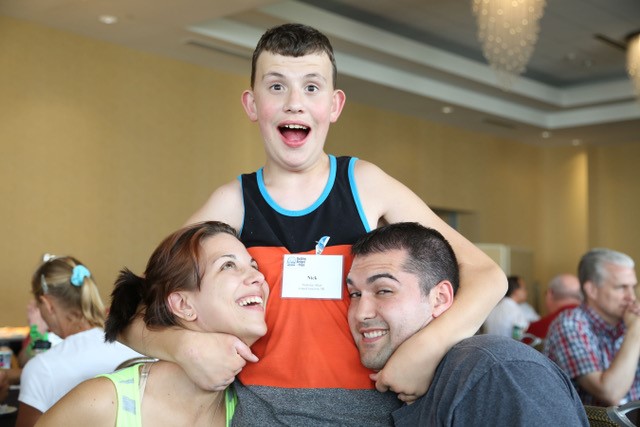Siblings of children and adults with Smith-Magenis syndrome face special needs of their own.
While each family is unique, brothers and sisters of individuals with SMS face particular challenges related to their siblings’ genetic diagnosis. As a sibling to someone with SMS, you may feel pressure to succeed, as if being exceptionally well-behaved and accomplished will somehow compensate for the challenges posed by your brother or sister with SMS.
Like a parent, you may feel great pride in your sibling’s achievements, no matter how small. And you may swing back and forth between positive and negative emotions about your brother or sister with SMS, becoming fiercely loyal one day, angry and exasperated the next. You are not alone.
While being a sibling to a child with SMS presents challenges, it also comes with unique and powerful opportunities.
Kids who grow up with a sibling with SMS may have more of a chance to develop many positive qualities, including:
- Patience
- Supportiveness
- Acceptance of differences
- Compassion
- Resiliency
- Empathy
- Loyalty


For the Sibling
Siblings of children with Smith Magenis syndrome often experience a unique set of emotions, responsibilities, and opportunities when it comes to their siblings with SMS. No doubt there are moments where you feel jealousy, worry, angry, and confusion towards your sibling with SMS. You have a right to be upset every now and then. But know that your unique experience has its ups as well. Your sibling completely and utterly loves you with a love stronger than most.
“When I was younger, I would get frustrated because I didn’t always understand what he was trying to convey. As I got older, I learned who Nick was and how he expressed himself. Our special bond has taught me patience like no other. I credit Nick to helping me be a better person and a better mother, now that I have my own son. He’s so excited to be an uncle, it melts my heart!”
-Tabitha Petkovich
“From as early as I can remember, Laura has made herself the center of attention. It does not matter if we are at home, at church, at the grocery store, or even at the PRISMS conference, Laura finds a way to make herself noticed. Growing up, I began to resent my sister for always drawing attention to our family. Not because I personally wanted the attention, I was never the attention-seeking type, but because sometimes I simply wanted to blend in. Although I never wanted the kind of attention that she got, I couldn’t help but feel like everything was all about her. Yet, despite all of the hard times, I know without a doubt that I would not be the person that I am today if I did not have Laura for a sister. having someone with SMS in our families gives us resilience unlike any other. I learned at a very early age what really matters in life, and how to not let a little bit of wind blow me over. But what I think I’ve learned the most, is how to laugh. My family can testify that more than anything else, even at inopportune times, Laura makes me laugh.”
-Jenny Beall
Potential Challenges
- As the brother or sister of someone with Smith-Magenis syndrome, you will face you’re your own set of challenges.
- You may find that there are financial and time pressures unique to your family as a result of SMS. This may mean fewer opportunities for extracurricular activities or family travel.
- You may find that your parents’ attention, at times, is more focused on your sibling with SMS and stress levels may be high in your family.
- You may find yourself afraid to speak with your parents about how you are feeling or worried that you may add to the stress already faced by your parents.
- Know that despite the unique challenges SMS can present to you and to your family, you are not alone.
Be Open
Don’t be afraid to express your feelings. You may find yourself confused at times by conflicting feelings. Being open is one of the most important things you can do. You do not need to feel as though you must keep your thoughts and feelings inside. Make time to speak with your parents, a friend, or therapist to talk openly about your emotions.
Seek Information
When you are ready, it is important that you understand and seek honest and accurate information regarding your siblings’ SMS diagnosis. Don’t be afraid to ask questions.
Resources for You
Get Connected
You are not alone. PRISMS offers a variety of ways for you to connect with other parents and caregivers of individuals with SMS.
Newly Diagnosed
We understand it can be overwhelming trying to process the diagnosis, understand a new challenging vocabulary, and come to terms with the ways in which this diagnosis will affect you, your loved one, and your family.
Early Intervention
Children with Smith-Magenis syndrome typically face delays in specific development areas. Early intervention is highly recommended and has proven successful for many individuals with SMS and their families.
Living with SMS
From Behavior and Sleep to Medical Management and Guardianship, there are a variety of factors to consider and educate yourself on when it comes to your loved one with Smith-Magenis syndrome.
Spread Awareness
It can be important to share information on Smith-Magenis syndrome with your local community such as the physicians, educators, and family who interact with your child or adult with Smith-Magenis syndrome regularly. PRISMS offers awareness tools to help.
Be a Part of Research
Research leads to answers. You and your loved one with SMS can help to advance research for the community by participating in one of our active research opportunities.
Attend the Conference
PRISMS hosts a biennial conference for the SMS community complete with opportunities to network and share with other families and engage and learn from professionals and researchers from around the world.



